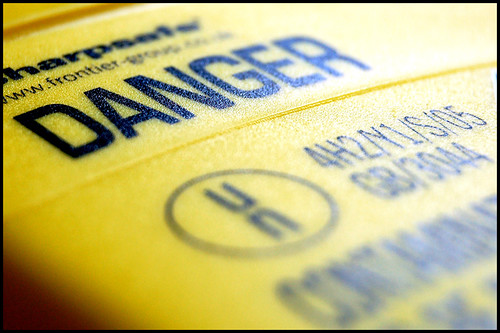The European Commission announced on Wednesday, April 6, signed an agreement with industry to protect consumer privacy in the use within the EU of electronic tags called "RFID." These chips, which can be read remotely and could one day replace bar codes are increasingly used: the passes for the subway, on cars - to identify them when they pass a toll and avoid stopping - on products for tracking the chain of shipment, or under the skin of customers that are happening nightclubs and identity cards and payment.
According to data provided by the Commission, about 2.8 billion chips should be sold in 2011, about one third in Europe. "By industry, there could be up to 50 billion electronic systems connected by 2020," also says the European institution, in a statement. But these smart chips are a potential risk to the privacy of the user.
"It becomes possible, particularly for third party access to your personal data (eg on your location) without your permission," notes the Commission. RISK ASSESSMENT The signatories to the agreement Wednesday, which include such distribution groups such as Carrefour and Metro, are committed to "ensuring that data protection issues are resolved before products (bearing a RFID chip) are placed on the market, "said European Commissioner responsible for new technologies, Neelie Kroes.
The agreement provides a methodology for assessing the risks to privacy, and remedy. It is "a pragmatic way to ensure safeguards for privacy" and "an interesting model that could be used in other areas," such as advertising-based online behavior of Internet users, "said Neelie Kroes. The agreement was also hailed as "a step in the right direction" (.
Pdf) by the association ANEC, who spoke on behalf of consumers on issues related to technology standards. The association warned however that it "expects the Commission to act if the industry does not respect its commitments." 


According to data provided by the Commission, about 2.8 billion chips should be sold in 2011, about one third in Europe. "By industry, there could be up to 50 billion electronic systems connected by 2020," also says the European institution, in a statement. But these smart chips are a potential risk to the privacy of the user.
"It becomes possible, particularly for third party access to your personal data (eg on your location) without your permission," notes the Commission. RISK ASSESSMENT The signatories to the agreement Wednesday, which include such distribution groups such as Carrefour and Metro, are committed to "ensuring that data protection issues are resolved before products (bearing a RFID chip) are placed on the market, "said European Commissioner responsible for new technologies, Neelie Kroes.
The agreement provides a methodology for assessing the risks to privacy, and remedy. It is "a pragmatic way to ensure safeguards for privacy" and "an interesting model that could be used in other areas," such as advertising-based online behavior of Internet users, "said Neelie Kroes. The agreement was also hailed as "a step in the right direction" (.
Pdf) by the association ANEC, who spoke on behalf of consumers on issues related to technology standards. The association warned however that it "expects the Commission to act if the industry does not respect its commitments."



- Did you know about radio frequency identification? (04/04/2011)
- Ascendent ID Augments RFID-based Yard Management System (29/03/2011)
- RFID-enabled vending machine ditches coinage, gets Mario Bros. tone (video) (05/04/2011)
- Plymouth-based RFID Startup Poised to Move (06/04/2011)
- RFID Alliance meets to carry out interoperability testing on RFID tag formats (01/04/2011)
No comments:
Post a Comment